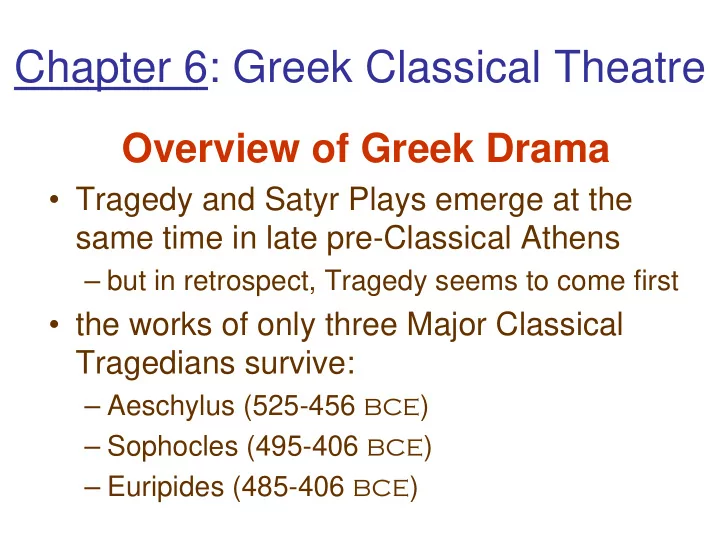

Chapter 6: Greek Classical Theatre Overview of Greek Drama • Tragedy and Satyr Plays emerge at the same time in late pre-Classical Athens – but in retrospect, Tragedy seems to come first • the works of only three Major Classical Tragedians survive: – Aeschylus (525-456 BCE BCE ) – Sophocles (495-406 BCE BCE ) – Euripides (485-406 BCE BCE )
Chapter 6: Greek Classical Theatre Overview of Greek Drama • the earliest known type of comic drama is the Satyr Play • “Old Comedy” is first presented at the Dionysia in 486 BCE BCE • first extant Old Comedies are by Aristophanes (mid-400’s – 386 BCE BCE ) – Cratinus (active from 440’s-420’s BCE BCE ) – Eupolis (active ca. 429-410 BCE BCE )
Chapter 6: Greek Classical Theatre Overview of Greek Drama • in the post-Classical period (after 404 BCE BCE ) tragedy begins to decline • comedy dominates Greek theatre – Middle Comedy (390’s- 320’s BCE BCE ) – New Comedy (after the 320’s BCE BCE ) • the greatest playwright of New Comedy was Menander (344-291 BCE BCE ) – but his work survives largely on papyrus
Chapter 6: Greek Classical Theatre Where were plays produced in antiquity? • Can we expect to find specially built “theatres” for the earliest dramas? • What should we look for in early venues where drama might have happened? – space for acting/impersonation – space for seating/viewing
Knossos (Crete)
Knossos (Crete)
Reconstruction of Knossos
Open Space at Knossus
Open Space at Knossus
Open Space at Knossus
Chapter 6: Greek Classical Theatre Theatre of Dionysus (Athens)
Chapter 6: Greek Classical Theatre Theatre of Dionysus (Athens) ORCHESTRA SKENE THEATRON
Chapter 6: Greek Classical Theatre Theatre of Dionysus (Athens) THEATRON ORCHESTRA SKENE
Chapter 6: Greek Classical Theatre Theatre of Thorikos (orchestra)
Chapter 6: Greek Classical Theatre Theatre of Thorikos (orchestra)
Chapter 6: Greek Classical Theatre Theatre of Thorikos (orchestra)
Chapter 6: Greek Classical Theatre Theatre of Dionysus ( theatron )
Chapter 6: Greek Classical Theatre Theatre of Dionysus ( theatron )
Chapter 6: Greek Classical Theatre Theatre of Dionysus ( theatron )
Chapter 6: Greek Classical Theatre Skene
Chapter 6: Greek Classical Theatre Skene
Chapter 6: Greek Classical Theatre Ekkyklema : a rolling platform Special Effects
Chapter 6: Greek Classical Theatre Special Effects Mechane : a crane used to lift actors into the air and fly them across the stage • not necessary in plays until the 420’s BCE BCE – but the end of Euripides’ Medea (431 BCE BCE )? • how did it work, e.g. actor twisting on rope? • when not in use, was it hidden from view? – i.e. how illusionistic was Classical Greek theatre
Chapter 6: Greek Classical Theatre How were Greek tragedies presented? • How many at a time? – Trilogies – actually tetralogies: 3 tragedies + satyr play • In what style? – Little opportunity for Interiority – Presentationalism • cf. courtroom trials
Chapter 6: Greek Classical Theatre How were Greek tragedies presented? • Who paid for the production? – Choregos (“producer”) – a rich man required to do public service • What was the playwright’s job? – Chorodidaskalos (“chorus-teacher”) – i.e. he taught the songs/dances to the chorus – and originally he acted in the play himself
Chapter 6: Greek Classical Theatre Masks
Chapter 6: Greek Classical Theatre Masks • masks allow for multiple-role playing • three-actor rule – protagonist – deuteragonist – tritagonist • why only three?
Chapter 6: Greek Classical Theatre Voices • must have been the actor’s principal tool – cf. modern opera singers • how difficult would it have been for the audience to know which actor was speaking at any moment? – with masked actors at some distance – thus, few trialogues , and all are found in later Classical tragedy
Chapter 6: Greek Classical Theatre Stichomythy (“line-talking”) • predictable pattern of conversation based on poetic meter • e.g. Euripides’ Hippolytus (347-352) Phaedra: What thing is this that men call love? Nurse: It’s sweetest, child, and bitter too. Phaedra: I’ve only known the latter, Nurse. Nurse: What’s that? Oh, you’re in love? With whom? Phaedra: That man, born from an Amazon . . . Nurse: Hippolytus? . . . Phaedra: . . . Quoth you, not I!
Chapter 6: Greek Classical Theatre The Finale of Euripides’ Orestes Apollo (the sun) Apollo on Orestes mechane , with mute on roof Helen of skene , with mutes playing Menelaus other roles on stage, with army Chorus in (secondary chorus) Orchestra
Recommend
More recommend